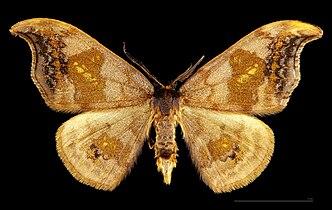Sabra harpagula
| Sabra harpagula | |
|---|---|

| |
| Scientific classification | |
| Kingdom: | |
| Phylum: | |
| Class: | |
| Order: | |
| Family: | |
| Genus: | |
| Species: | S. harpagula
|
| Binomial name | |
| Sabra harpagula | |
| Synonyms | |
| |
Sabra harpagula, the scarce hook-tip, is a moth of the family Drepanidae first described by Eugenius Johann Christoph Esper in 1786. It is found from Europe through temperate Asia to Japan.
The wingspan is 25–35 mm. The moth flies from June to August depending on the location.
-
♂
-
♂ △
The larvae feed on Tilia (including Tilia cordata), Quercus, Alnus and Betula species.
Subspecies[edit]
- Sabra harpagula harpagula (Europe, south-eastern Russia, Manchuria)
- Sabra harpagula bitorosa (Watson, 1968) (China: Sichuan, Shaanxi)
- Sabra harpagula emarginata (Watson, 1968) (China: Zhejiang, Fujian)
- Sabra harpagula euroista Park, 2011 (Korea)
- Sabra harpagula olivacea (Inoue, 1958) (Japan)
References[edit]
External links[edit]
Wikimedia Commons has media related to Sabra harpagula.
Wikispecies has information related to Sabra harpagula.
- Kimber, Ian. "65.006 BF1650 Scarce Hook-tip Sabra harpagula (Esper, 1786)". UKMoths. Retrieved 12 November 2019.
- Moths and Butterflies of Europe and North Africa
- Lepiforum e.V.


